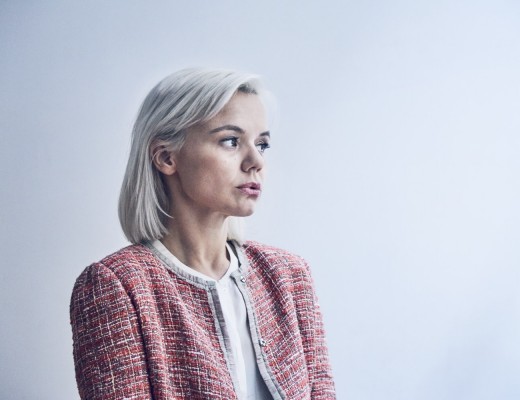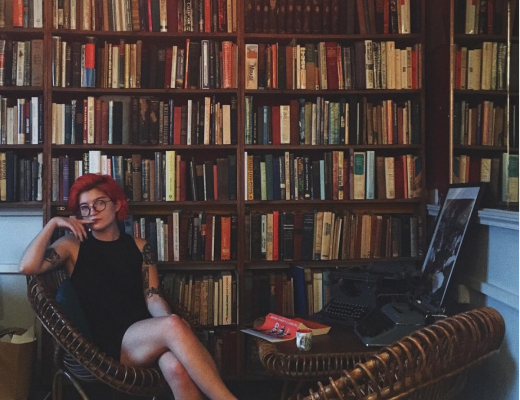
Fariha Róisín describes herself simply as “a writer living on Earth”. Her writing is featured in Al Jazeera, The Guardian, Vice and Hazlitt. Vogue calls her the “writer whose standout voice and style can’t be ignored”. As a young, queer Muslim woman, Fariha challenges normative conceptions of religion, race, mental health, sexuality and womanhood.
An Interview with Fariha Róisín:
When did you first know you were a writer, and what does it take to be one?
I started writing a book at 12, so I guess on some level I always knew I was one. But, I don’t think I really accepted that I was a writer until two years ago. I still suffer from MASSIVE imposter syndrome (though, it was quite a bit more intense a few years ago!) and the feeling that somebody scoffs at the idea of you calling yourself an “artist” or a “writer” is a very gendered fear. Like, only femmes would be questioned about the sincerity of their art practice which I think does something to your psyche. It’s almost as if you always have to show proof, or deference to other authors to authenticate you, because the culture around claiming your art is so cis-het and bro-ey.
I think being honest and having integrity to your words is key to being a writer.
Which writers have most inspired your work and why?
James Baldwin: He’s legitimately a genius. Like, I’ve never seen anyone wield their way with words with such eloquence ever before. He’s also the best essayist!
Rabindranath Tagore: He’s a familial yolk. He’s also one of the most fascinating and lyrical writers I’ve ever read.
Virginia Woolf: Her mind, her brilliance, her ability to describe such small details with such ingenuity.
Tracy K. Smith: Such charming poetry, she has the unique ability to bring folklore and modernity together in a way that is truly captivating. I love her ability to describe strangeness.
Clarice Lispector: My favorite novelist, besides Baldwin. They’re the only two whose entirety of work I’ve read! There’s magic when I read Lispector.
Maggie Nelson: She’s arguably one of the best thinkers today. Her ability to write about so much, with such passion and insight, is continually inspiring.

You’ve written that you have spent a lifetime apologizing for who you are to your family and friends you grew up with. This sentiment is shared by many independent-minded women growing up in a devoutly religious home. In your connecting with women across the globe online, what other shared experiences have you discovered across a variety of backgrounds?
We all want to be loved. We are also all trying to heal. It never ceases to amaze me to learn how many women are so hurt by their families… and how deeply many of them want to connect with them, to be accepted by them. It’s tragically ubiquitous.
In a recent post, you shared openly about your past experience in an abusive relationship. What would you say to your younger self who was in the midst of this trauma?
He’s not worth it.
After losing your faith as an 18-year-old, you now believe Islam is about transcending those urges to judge, hurt, speculate, and, inevitably, compare yourself to others. What helped you to build your new understanding of being Muslim? Were any of your peers influential in your coming to the place of offering love to others as an act of faith?
The nature of what I’m talking about meant that I was incredibly isolated. I started writing about it at a time where there wasn’t a lot of support, either. I felt exhausted by the pressure of appearing a certain way, and the ridiculousness of denying the duality of my being. If I’m being honest, too, being a queer, Muslim woc with tattoos wasn’t a space that had been carved out (or at least I didn’t openly see it) so I felt really alone trekking down that road.
But, I have found incredible solace from my Muslim peers, and feel so lucky to have such stimulating wonderful humans in my life who have allowed me to accept my complex Muslim identity—shout out to Safia Elhilo, Ayqa Khan, Huda Hassan, Hawa Arsala, Ifrah Ahmed, Nafisa Kaptownwala, Sarah Hagi, Mohammed Fayaz, Muna Mire, Bianca Vivion and so many more!
 You share frankly and openly about your personal experiences. When did you first start revealing yourself in this way to an audience, and how has it transformed you?
You share frankly and openly about your personal experiences. When did you first start revealing yourself in this way to an audience, and how has it transformed you?
I think the nature of the internet is that it distills you into a punchline, or some half-assed brand. I was talking to Adrian Chen recently about identity and how, despite not always wanting things to be brought back to my own, sometimes it’s almost liberating to talk about the thing that binds you, or limit you. Especially when you know it’s kinda like an elephant in the room. Also, sadly, it’s what makes you marketable. Which I think it’s part of the problem… publications aren’t nurturing relationships with people to hire them as editors or writers, just freelancers for a quick identity piece. It’s demoralizing in that sense. However, it’s also been helpful and cathartic to write about my nuances and have them land, or relate, to others out there on the world wide web.
How do you feel about the rise of political activism through social media in recent years? Does it create a forum for productive conversations or a sense of false involvement?
I have a lot of mixed feelings about all this. My partner is ten years older than me and he grew up without the advent of the internet, or Tumblr, or without politics becoming some kinda tool for social capital, and he often laments that it seems like for some it’s a way to feel superior, or that constantly “calling people out” or “dragging” people online is more damaging because it never takes someone’s life into context. So, it’s been helpful to talk to him and to both be challenged by him, and challenge him, about certain ideals. Also—I think, on the other hand, it’s great that (white) people have learnt better ways to be an accomplice… I think for myself, I’ve learnt a lot about anti-blackness, and I really appreciate that as a NBPOC who navigates the world with my various privileges. I’ve also learnt so much about transness, or ablelism, and I feel so grateful because I am definitely a better more cognizant, considerate human being for those reasons. I just think a lot of the time it can be a race to “wokeness” without considering why you’re doing or saying things. Or writing people off completely because they said something problematic ONCE and it’s beginning to feel futile and unhealthy at times. I don’t know if it’s the best approach, and sometimes the internet feels fucking scary for those reasons.
Follow Fariha on twitter @fariharoisin and instagram @fariha_roisin.
Next up Fariha will interview an artist of her choosing, as we introduce our new format of artists interviewing artists.
Each featured artist will select the next, building a dynamic community and conversation between creative women across the world. Stay tuned by subscribing to the Girl Trip newsletter on the right panel of this page.



No Comments